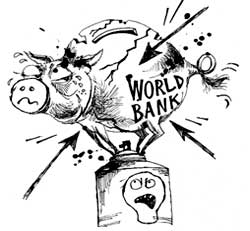Pest of policy
 IN SPITE of the worldwide controversy over the continuing use of pesticides, the World Bank (WB) has diluted its norms related to pesticides and pest management policy. The wb's attitude was roundly criticised by a group of over 100 environmental, consumer and developmental organisations belonging to different countries on the eve of the World Food Summit at Rome.
IN SPITE of the worldwide controversy over the continuing use of pesticides, the World Bank (WB) has diluted its norms related to pesticides and pest management policy. The wb's attitude was roundly criticised by a group of over 100 environmental, consumer and developmental organisations belonging to different countries on the eve of the World Food Summit at Rome.
The Bank's earlier policy made it mandatory for the staff to promote an ecologically sustainable approach and to minimise pesticide use. This approach meant that instead of chemicals, predatory insects were used to eat crop-damaging insects, while farmers were given lessons on ecological management and were encouraged to develop locally appropriate pest control methods that blend tradition with modern science. This July, however, wb changed its policy to one that "takes a weaker stance on the environmental assessment of pesticides, by adding a phrase which allows pesticides to be considered safe if they have passed a pre-existing environmental assessment', according to Mimi Kleiner, a policy analyst at the Washington-based Environmental Defence Fund. In other words, "field conditions
Related Content
- From climate risk to resilience: unpacking the economic impacts of climate change in Kenya
- Indian agriculture towards 2030
- Securing food for all in Bangladesh
- Potential Impacts and Demand for Picture-Based Crop Insurance Qualitative research findings from Haryana State, India
- Economic and health impacts of genetically modified eggplant: results from a randomized controlled trial of Bt brinjal in Bangladesh
- UN Fears Fall Armyworm Outbreak Threatens Zimbabwe’s Food Security
